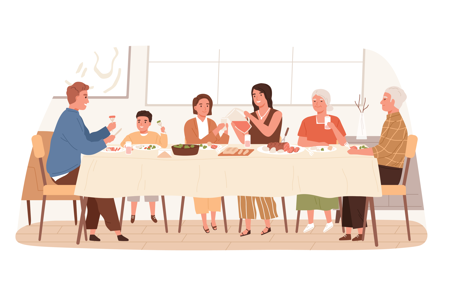Navigating complex family relationships during the holidays
The holidays can be a difficult time for many families, bringing up conflicts, grief and other stressors that may be pushed to the side or hidden during other times of year.
Common issues which may come up include:
- existing tensions between family members
- family estrangement
- co-parenting after separation
- grief over the loss of a family member or separation from family and friends.
If you’re worried, stressed or anxious about upcoming family gatherings over the holiday season, the following tips may help you to prepare.
- Practice good communication with your family, and be clear about everyone’s expectations for the holidays.
- Know that it’s valid and important to set boundaries and you can always say ‘no’ to an event or a request.
This includes:- declining an event invitation if it feels too physically or mentally overwhelming
- deciding not to go to a gathering if there’s someone attending who you have a complicated or toxic relationship with
- setting limits on how much you can assist with organising an event
- choosing not to engage with a family member, if engaging with them is going to have a negative impact on you and your wellbeing.
- Plan for how to respond to family members or topics of conversation which you find difficult or triggering.
Write down some possible responses, for example:- ‘I’d prefer not to talk about this at the moment.’
- ‘I don’t think this is a helpful conversation for us to have right now.’
- ‘I hear what you’re saying but I would prefer to…’
- ‘Perhaps we could talk about… instead.’
- ‘Thank you for your advice. I’d prefer not to discuss this right now. However, I’d love to hear about… instead.’
- Organise a support person. Is there someone in your family who you trust and can lean on if things get tough? Consider reaching out to them before the event to check in and discuss how you can support each other if conflict comes up.
- Have an exit strategy and plan for getting home, in case you want to leave early. If you’re not driving, ask a supportive family member or friend, check the local public transport routes, or install a taxi or ride share app onto your phone. Having this planned in advance can help you to feel calmer on the day of the event.
- Check in with yourself regularly about how you’re feeling and consider what self-care strategies might be helpful to you.
This might include:- regular exercise
- eating and sleeping well
- spending time with trusted friends and family
- practicing mindfulness, meditation or breathing exercises (apps such as Smiling Mind can help with this)
- doing a fun or creative activity.
This post does not constitute professional advice. It is for informational purposes only. To speak to a counsellor, contact your nearest Relationships Australia Victoria centre or view our list of external mental health services that can support you.
Please note that we are not a crisis service. If you are in immediate danger, call emergency services on 000 (triple zero).
More tips and resources
Booklets & tip sheets

Managing stress during the holidays - Tip sheet
How to identify stress and 9 tips to help you cope.
Download
pdf, 812KB
Videos & podcasts
Tips for managing conflict - Video
View
Booklets & tip sheets
Managing family conflict - information for young people - Tip sheet
Download
pdf, 376KB
